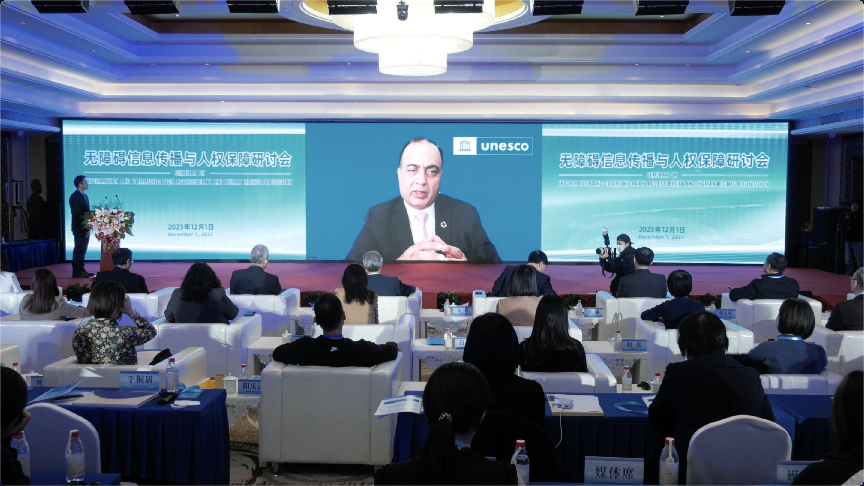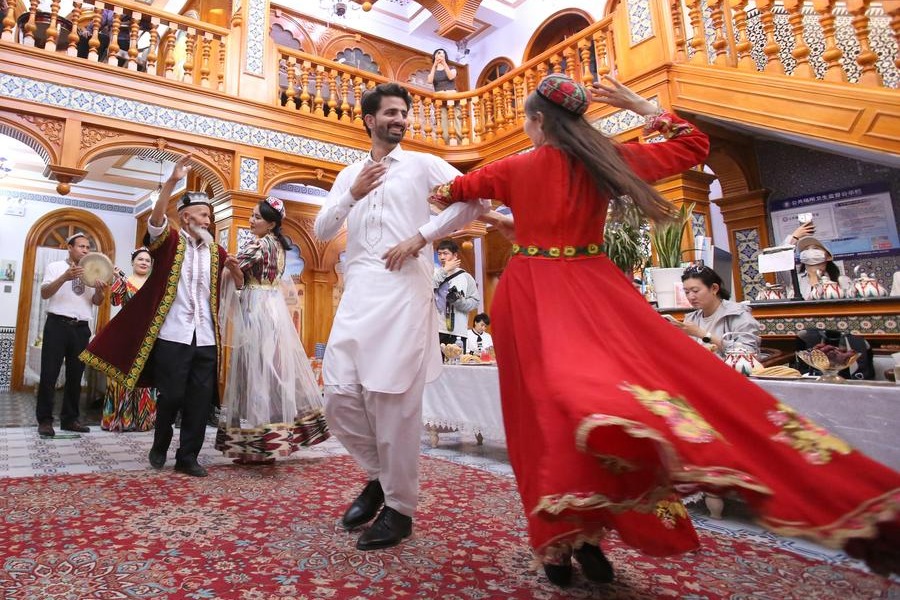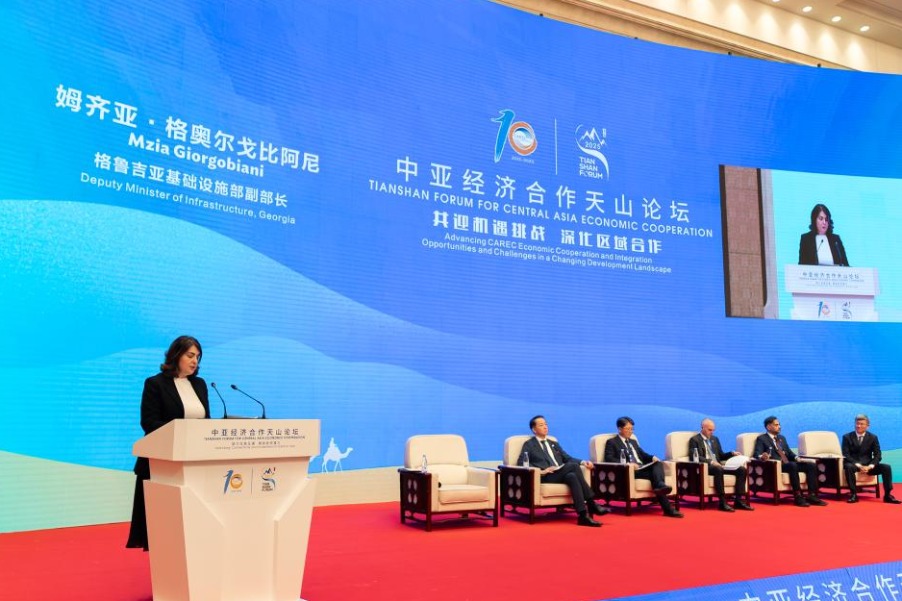Intl seminar on information and communication accessibility and human rights protection held in Beijing


BEIJING - UNESCO officials and representatives from more than ten countries convened at a seminar in Beijing on Friday to share experiences and explore ways to enhance the inclusiveness of the society for people with disabilities.
At the seminar, jointly hosted by Communication University of China and UNESCO, officials and scholars from China, France, Mongolia and Malaysia discussed - either on-site or through video - ways to promote the information accessibility and empowerment of people with disabilities.
The seminar is the first time that Chinese universities have cooperated with UNESCO to conduct global exchanges on the theory and practice of information accessibility. It aims at building a high-end platform to promote global information accessibility and protect human rights.
Themed under "Constructing Disability Inclusive Societies: Experiences from China, Mongolia and Indonesia," the seminar intended to build a platform for exchange and cooperation to collect international excellent cases, promote equal rights to information, and jointly formulate a global development framework for constructing a digitally inclusive society of "equality, integration and sharing" on the occasion of the 32nd International Day of Persons with Disabilities.
Professor Shahbaz Khan, director of UNESCO Regional Office for East Asia; Zuo Feng, vice-chairman and secretary-general of the China Foundation for Human Rights Development; You Liang, vice-president of Executive Board of China Disabled Persons' Federation; and Professor Liao Xiangzhong, secretary of the Party Committee of CUC and honorary president of the Research Institute on Information and Communication Accessibility of CUC, attended the event and delivered speeches respectively.
Professor Liao Xiangzhong pointed out that over the years, CUC has taken advantage of its expertise to conduct a deep dive into information and communication accessibility, promoting the maximization of rights and interests of people with disabilities through solid research and practice achievements, which has met their increasing spiritual as well as cultural needs, and further enhanced their sense of achievement, well-being, and security.
Professor Shahbaz Khan said in his video speech that UNESCO, through its Information for All Program, places universal access to information at the forefront of building just digital societies. He said the seminar provides a valuable platform, and he hopes the discussions at the seminar could inspire us to build a more equitable and inclusive digital future, where no individual or community is marginalized from enjoying the vast possibilities of the digital age.
Zuo Feng said in recent years, China has comprehensively pushed forward the construction of information accessibility, enhanced the supply of information accessibility terminal products, and advanced the technological innovation and promotion of accessible products and services. He said the country has also promoted the dynamic integration of informatization and accessible environments, and strengthened the construction of braille and sign language disciplines as well as the talent cultivation. Efforts have also been made to eliminate information divide, promote social inclusiveness, and the protect rights and interests of specific groups such as people with disabilities, with improvements being seen already. He said these efforts have become vivid examples of the progress and development of China's human rights endeavors, and have won wide acclaim from the international community.
You Liang put forward suggestions for promoting the construction of information and communication accessibility: relevant regulations and standards on information accessibility should be further improved, and a sound and long-term working mechanism for promoting information accessibility should be established. Besides, policy support should be increased, and publicity and international exchange and cooperation should be further strengthened.
In the afternoon's seminar themed "Universal Accessibility and the Empowerment of Persons with Disabilities: Global Perspective and International Best Practices," ten experts and scholars from UNESCO, the Institute of Scientific and Technical Information of China, Renmin University of China, University of Nottingham Ningbo and other relevant organizations at home and abroad delivered keynote speeches. Professor Zeng Xiangmin from the School of Television, CUC, presided over the discussion.
Doctor Marielza Oliveira, director for Division for Digital Inclusion and Policies and Digital Transformation and Secretariat of the Information for All Programme, UNESCO, released the Information for All Programme Strategic Programme 2023-2029 in a video presentation.
Hu Xianhong, programme specialist at UNESCO IFAP Secretariat delivered a speech on "The Humanitic and Human Rights-based Approach of Digital Transformation and Meaningful Access Including Persons with Disabilities."
Professor Zhao Shuping, director of Academic Board, Research Institute on Information and Communication Accessibility, CUC, introduced the audiovisual practice and Chinese model of accessible information communication using "Guangming Cinema" as a case study.
Cordel Green, chair of UNESCO IFAP working group, delivered a video speech entitled "Human agency – Handmaiden to Accessibility."
Li Xiao, vice director of ISTIC, focused on technology-enabled accessible communication, discussing how to practise the IFAP concept and empower accessible communication with information intelligence technology.
Professor Lu Haina from RUC and Professor Eugene Ch'ng from UNN expressed their views on information accessibility from a gender perspective and the perspective of museum website construction respectively.
At the seminar, Professor Wu Weihua from RIICA of CUC, presented the experiencing project of "Guangming Museum." This project pioneered the development of a combination of barrier-free perception (hearing, smelling, touching and feeling) and digital museum model. It relies on multiform content products, such as barrier-free NFC activation of museum information, audio tours, touchable exhibits, volunteers' interaction manuals and online cloud exhibition halls, to create a barrier-free museum tour experience for visually impaired groups. Wu said the "Guangming Museum" responds to the concepts of cultural empowerment, information empowerment and technological accessibility advocated by UNESCO with barrier-free communication practices, providing a Chinese solution to the innovative development of accessible museums.
This is the first seminar jointly organized by CUC and UNESCO, and the event will be held on an annual basis in the future. Fu Haizheng, executive director of RIICA of CUC, announced the theme of 2024 CUC-UNESCO Conference, "Accessible Information Communication and Digital Literacy."
As a university included in the "double world-class project," CUC has been striving to bring its academic advantages in communication studies into universal information accessibility practices and studies. At the end of 2017, CUC teachers and student volunteers, together with Beijing Gehua CATV Network and Dongfang Jiaying Television Cinema Media Co Ltd, jointly launched "Guangming Cinema (voice illustrated movies for visually impaired people)" - China's first barrier-free film public welfare project - to serve more than 17,000,000 visually impaired people across China.
Over the past six years, more than 800 teachers and student volunteers of "Guangming Cinema" have produced nearly 600 barrier-free films, which have been sent to 2,244 special education schools in 31 provinces (autonomous regions and municipalities) and Macao SAR, including 14 poverty-stricken areas designated by the State Council. It gives 200,000,000 households access to barrier-free movies through its free on-demand service.
Building on Guangming Cinema Project, the Research Institute on Information and Communication Accessibility of CUC was founded in 2020. Dedicated to universal information accessibility studies, the institute hopes to contribute to the promotion of cultural sharing and the construction of a culturally strong country.
- Police punish shopper after AI video used in fake crab claim
- Historians identify Chinese pilot saved by John Rabe in Nanjing
- Rainforest-themed activities launched in Hainan
- Hebei advances intelligent construction and prefabricated housing
- Seventh Hainan Island International Film Festival opens in Sanya
- Former chairman of Guangxi government expelled from CPC, public office





































